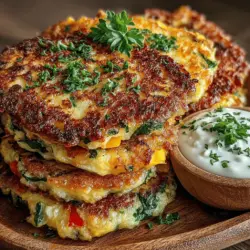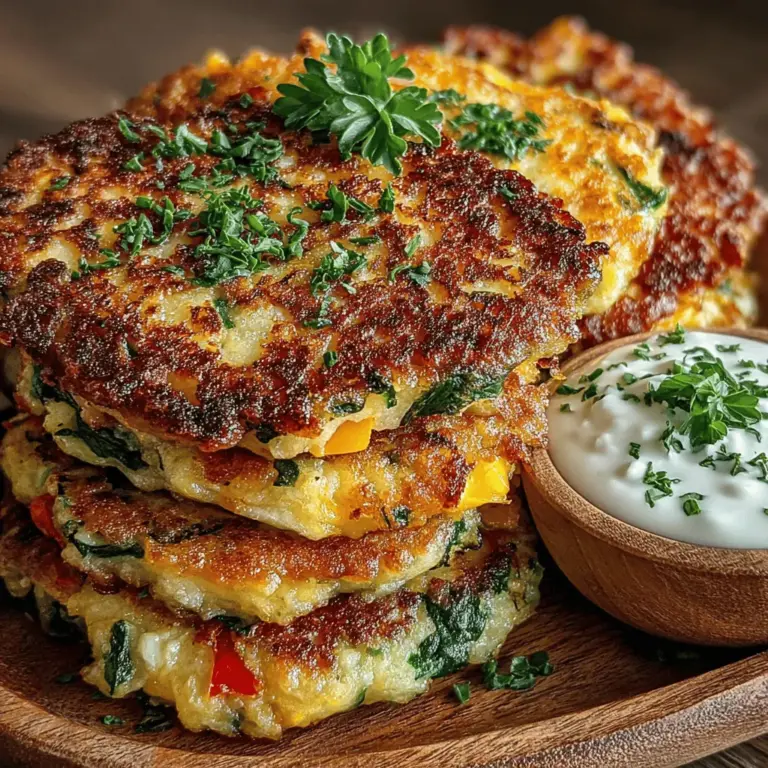Colorful Mini Veggie Pancakes Recipe: A Delicious Twist on a Classic Favorite
In recent years, there has been a notable surge in the popularity of vegetable-based recipes, driven by a growing awareness of the myriad health benefits of incorporating more plant-based foods into our diets. As people strive to eat healthier and make more conscious food choices, creative recipes like Colorful Mini Veggie Pancakes have emerged as delightful solutions. These pancakes are not only visually appealing but also versatile enough to be served for breakfast, brunch, or even as a wholesome snack.
The appeal of Colorful Mini Veggie Pancakes extends beyond their vibrant colors and enticing flavors. They are especially beneficial for families with children or picky eaters, as they offer a clever way to sneak in vegetables without sacrificing taste. By incorporating a variety of colorful vegetables, these pancakes deliver essential nutrients, making them a smart addition to any meal plan.
Understanding the Ingredients
To create the perfect batch of Colorful Mini Veggie Pancakes, it’s essential to understand the role of the ingredients involved. The main components include all-purpose flour, buttermilk (or a plant-based alternative), and a medley of grated vegetables such as zucchini, carrots, bell peppers, and leafy greens like spinach or kale.
Flour Selection
All-purpose flour serves as the foundation of this recipe, providing the necessary structure and texture. However, for those with gluten sensitivities or preferences, alternatives such as almond flour, oat flour, or gluten-free all-purpose blends can be utilized without compromising the pancake’s integrity.
The Role of Buttermilk
Buttermilk or its plant-based equivalents are crucial for achieving the right texture in these pancakes. The acidity of buttermilk activates the baking powder, resulting in pancakes that are light and fluffy. If you’re opting for a dairy-free version, consider using almond milk, soy milk, or oat milk mixed with a teaspoon of vinegar or lemon juice to mimic the acidity of buttermilk.
Nutritional Powerhouses
The vegetables chosen for this recipe not only add a pop of color but also pack a nutritional punch. Zucchini is low in calories and high in water content, making it a great choice for hydration and fiber. Carrots are well-known for their beta-carotene content, which supports eye health. Bell peppers, especially the red, yellow, and orange varieties, are rich in vitamins A and C, while leafy greens like spinach and kale contribute iron, calcium, and antioxidants, making these pancakes a nutritious choice for any meal.
Flavor Enhancers
To elevate the flavor profile of the pancakes, seasoning ingredients such as garlic powder, onion powder, salt, and black pepper are added. These spices enhance the overall taste without overwhelming the natural flavors of the vegetables, ensuring a balanced and delicious result.
Step-by-Step Instructions for Making Colorful Mini Veggie Pancakes
To embark on your culinary adventure with Colorful Mini Veggie Pancakes, follow these detailed steps to ensure a successful outcome:
1. Gather Your Ingredients
Start by assembling all your ingredients: all-purpose flour (or a gluten-free alternative), buttermilk or plant-based milk, grated vegetables (zucchini, carrots, bell peppers, and spinach/kale), garlic powder, onion powder, salt, and black pepper. Having everything on hand will streamline the cooking process.
2. Prepare the Vegetables
Grate the zucchini and carrots using a box grater or a food processor. For bell peppers, finely chop them into small pieces. If you’re using spinach or kale, chop them finely to ensure they mix well into the pancake batter. Drain excess moisture from the grated zucchini to prevent the batter from becoming too wet.
3. Mix the Dry Ingredients
In a large mixing bowl, combine the all-purpose flour, garlic powder, onion powder, salt, and black pepper. Whisk the dry ingredients together to ensure they are evenly distributed, which is crucial for consistent flavor and texture.
4. Combine the Wet Ingredients
In a separate bowl, whisk together the buttermilk (or plant-based milk) and a large egg (or flaxseed egg for a vegan version). Mix until well combined, ensuring that the egg is fully incorporated.
5. Incorporate the Vegetables
Add the grated vegetables to the wet mixture and stir until the veggies are evenly coated. This step is essential as it ensures the vegetables are well-distributed throughout the batter, enhancing both flavor and nutrition.
6. Combine Wet and Dry Mixtures
Gradually pour the wet mixture into the bowl with the dry ingredients, stirring gently until just combined. Be careful not to overmix; a few lumps are perfectly fine. The goal is to create a batter that is thick yet pourable.
7. Heat the Skillet
Place a non-stick skillet or griddle over medium heat and add a small amount of oil to coat the surface. Allow it to heat for a couple of minutes until it’s hot enough that a drop of batter sizzles upon contact.
8. Cook the Pancakes
Use a tablespoon or a small ladle to pour the batter onto the skillet, forming mini pancakes. Cook for about 2-3 minutes on one side, or until bubbles form on the surface and the edges look set. Carefully flip the pancakes and cook for an additional 1-2 minutes on the other side until golden brown.
This introductory guide sets the stage for creating delicious Colorful Mini Veggie Pancakes, highlighting the importance of ingredient selection while providing a clear pathway to your culinary success. Stay tuned for the next sections, where we’ll delve deeper into the health benefits of these mini pancakes and explore how to customize them for your family’s taste preferences.
{{image_2}}
Preparing the Vegetables
The foundation of delicious Colorful Mini Veggie Pancakes lies in the careful selection and preparation of vegetables. Using fresh, vibrant produce not only enhances the flavor but also elevates the nutritional value of your pancakes. When incorporating zucchini, one key aspect to consider is moisture management. Zucchini has a high water content, which can lead to soggy pancakes if not handled properly.
To manage moisture, start by grating the zucchini and then placing it in a clean kitchen towel or cheesecloth. Squeeze out excess moisture before adding it to the batter. This simple step ensures a fluffier pancake and prevents the batter from becoming too runny. Additionally, consider seasonal vegetables like bell peppers, carrots, and spinach that not only add color but also offer unique flavors and textures. Always choose the freshest produce available; organic vegetables can be a great choice, as they typically contain fewer pesticides and pack more nutrients.
Mixing the Batter
Once your vegetables are prepared, it’s time to mix the batter. The goal here is to keep your pancakes fluffy and light, which can be achieved through a few key techniques.
Start by combining dry ingredients—such as flour, baking powder, and any spices—separately from wet ingredients. This method helps ensure even distribution of the leavening agent, which is essential for achieving that light and airy texture. When you incorporate your wet ingredients, such as milk (or a non-dairy alternative) and eggs (or a flaxegg for a vegan option), mix gently. Overmixing can lead to dense pancakes, so stir just until the ingredients are combined.
If you’re looking to elevate the flavor profile, consider adding a dash of nutritional yeast or herbs like dill or parsley to the batter. These ingredients not only enhance the taste but also contribute to the overall nutritional benefits of your pancakes.
Incorporating Vegetables
Now comes the fun part—folding the prepared vegetables into the batter. This step is crucial for maintaining the right consistency of your pancakes. Gently fold in the grated zucchini, chopped bell peppers, and any other vegetables you’re using, ensuring they are evenly distributed without overworking the batter. Overmixing the batter at this stage can result in a tough pancake, so treat it gently.
If you want to add a bit more texture, consider incorporating a handful of corn or peas into the mixture. These additions not only enhance the taste but also provide additional nutrients and a delightful pop when you bite into the pancakes.
Cooking Techniques
Achieving golden-brown perfection with your mini veggie pancakes starts with optimal cooking techniques. Preheat your pan over medium heat and add a small amount of oil—coconut or olive oil works well. To test the pan’s readiness, drop a small spoonful of batter onto the skillet; if it sizzles, you’re good to go.
Cook the pancakes for about 2-3 minutes on one side or until the edges start to look set and bubbles form on the top. Flip them gently using a spatula, and cook for an additional 1-2 minutes on the other side until they turn golden brown. It’s essential to resist the urge to flip them too early, as they need time to develop that crispy exterior.
If you find that your pancakes are browning too quickly, reduce the heat slightly. Cooking at a lower temperature allows the insides to cook through without burning the outside.
Serving Suggestions
Colorful Mini Veggie Pancakes are incredibly versatile, making them perfect for breakfast, lunch, or dinner. To elevate your serving experience, consider pairing them with a variety of dips and garnishes. A simple avocado yogurt dip can add a creamy richness, while a zesty lemon-tahini sauce can provide a delightful contrast to the savory pancakes.
Fresh herbs like cilantro or parsley can be sprinkled on top for added flavor and a pop of color. You can also serve these mini pancakes with a side of fresh salad or sliced cucumbers to create a well-rounded meal. For a heartier option, pair them with grilled chicken or chickpeas for a protein boost.
Vegan and Allergy-Friendly Adaptations
Making your Colorful Mini Veggie Pancakes vegan-friendly is straightforward. Instead of eggs, you can use a flaxegg as a binding agent. To prepare a flaxegg, simply mix one tablespoon of ground flaxseed with three tablespoons of water and let it sit for about 5 minutes until it thickens. This substitute works exceptionally well in recipes that require binding.
For those with gluten sensitivities, you can easily substitute regular flour with a gluten-free blend. Options like almond flour, oat flour, or even chickpea flour can create delicious alternatives that maintain the pancake’s texture and flavor. Just be cautious with the amounts, as gluten-free flours may absorb moisture differently.
Additionally, if you’re catering to nut-free or dairy-free diets, ensure that your milk alternative is suitable and opt for nut-free flour options. It’s essential to read labels carefully and choose ingredients that align with your dietary needs.
Incorporating Mini Veggie Pancakes into Your Meal Plan
Colorful Mini Veggie Pancakes can seamlessly fit into your meal plan in various ways. For breakfast, serve them alongside a fruit salad or a smoothie for a balanced start to your day. They also make a fantastic lunch option, especially when paired with a protein-rich food like scrambled eggs or tofu.
If you have leftovers, don’t let them go to waste! Mini veggie pancakes can be repurposed in several creative ways. Try crumbling them into a salad for added texture or heating them up for a quick snack with your favorite dip. They can also be used as a base for mini veggie sliders—just add your favorite protein and toppings for a fun twist.
Conclusion
Incorporating Colorful Mini Veggie Pancakes into your meals not only enhances your culinary repertoire but also brings a wealth of nutritional benefits. These pancakes are a fantastic way to sneak more vegetables into your diet, making them ideal for both kids and adults.
Experimenting with different vegetables and flavors can lead to endless variations, allowing you to customize the recipe to your taste preferences. Remember, the key to a healthy diet is variety, and these mini pancakes offer an enjoyable and delicious way to include more greens in your everyday meals. So gather your ingredients, unleash your creativity, and enjoy the vibrant flavors of Colorful Mini Veggie Pancakes for a wholesome culinary experience.

